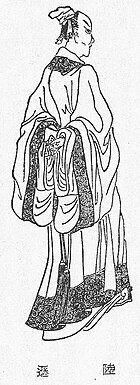
Back Lu Xun (Tres Regnes) Catalan Lu Xun (Drei Reiche) German Lu Xun (Tres Reinos) Spanish لو ژون (وو شرقی) Persian Lu Xun (Trois Royaumes) French Lu Xun (Kisah Tiga Negara) ID 陸遜 Japanese 육손 Korean Lu Xun (Wu) Dutch Lu Xun (De tre riker) NB
Lu Xun | |
|---|---|
| 陸遜 | |
 A Qing dynasty illustration of Lu Xun | |
| Imperial Chancellor (丞相) | |
| In office January or February 244[a] – 19 March 245[b] | |
| Monarch | Sun Quan |
| Preceded by | Gu Yong |
| Succeeded by | Bu Zhi |
| Senior General-in-Chief (上大將軍) | |
| In office 229 – January or February 244 | |
| Monarch | Sun Quan |
| Succeeded by | Lü Dai |
| Right Protector-General (右都護) | |
| In office 229 – January or February 244 | |
| Monarch | Sun Quan |
| Grand Chief Controller (大都督) | |
| In office 228 | |
| In office 222–223 | |
| Monarch | Sun Quan |
| General Who Assists the State (輔國將軍) | |
| In office 222–229 | |
| Monarch | Sun Quan |
| Governor of Jing Province (荊州牧) | |
| In office 222–229 | |
| Monarch | Sun Quan |
| General Who Guards the West (鎮西將軍) | |
| In office 219–222 | |
| Personal details | |
| Born | 183[c] Wu County, Wu Commandery, Han Empire (present-day Suzhou, Jiangsu) |
| Died | 19 March 245 (aged 62)[b] Wuchang, Eastern Wu (present-day Ezhou, Hubei) |
| Spouse | Lady Sun |
| Children |
|
| Parent |
|
| Relatives | |
| Occupation | General, politician |
| Courtesy name | Boyan (伯言) |
| Posthumous name | Marquis Zhao (昭侯) |
| Peerage | Marquis of Jiangling (江陵侯) |
| Original name | Lu Yi (陸議) |
Lu Xun (183 – 19 March 245),[c] courtesy name Boyan, also sometimes referred to as Lu Yi, was a Chinese military general and politician of the state of Eastern Wu during the Three Kingdoms period of China. He started his career as an official under the warlord Sun Quan in the 200s during the late Eastern Han dynasty and steadily rose through the ranks. In 219, he assisted Sun Quan's general Lü Meng in an invasion of Jing Province, which led to the defeat and death of Liu Bei's general Guan Yu. In 222, he served as the field commander of the Wu army in the Battle of Xiaoting against Liu Bei's forces and scored a decisive victory over the opponent. Lu Xun reached the pinnacle of his career after this battle as Sun Quan regarded him more highly, promoted him to higher positions and bestowed upon him unprecedented honours. Throughout the middle and later parts of his career, Lu Xun oversaw both civil and military affairs in Wu while participating in battles against Wu's rival state, Wei, from time to time. In his final years, Lu Xun was drawn into a succession struggle between Sun Quan's sons and fell out of Sun Quan's favour as a consequence. He managed to retain his appointment as Imperial Chancellor – an office he assumed in 244 – but died a year later in frustration. Lu Xun's role in the Wu government was likened to that of a custos morum as he believed firmly in and upheld Confucian principles and practices.[3] On the one hand, he provided constant and timely advice to Sun Quan to exercise benevolence and consider the welfare of the people. On the other hand, he vehemently objected to Sun Quan's idea of replacing his legitimate heir apparent in favour of a younger son.
Cite error: There are <ref group=lower-alpha> tags or {{efn}} templates on this page, but the references will not show without a {{reflist|group=lower-alpha}} template or {{notelist}} template (see the help page).
- ^ (「惟赤烏八年二月,粵乙卯……陸公(陸遜)薨。」) Anthology of Lu Shilong (Siku Quanshu edition) (陸士龍集 (四庫全書本)) vol. 5.
- ^ (... 遜憤恚致卒,時年六十三, ...) Sanguozhi vol. 58.
- ^ "【汉朝·陆逊】忍辱负重保江山 (Translation: [Han dynasty · Lu Xun] Enduring humiliation for the sake of preserving the state)" (in Chinese). 一元一国学网 (yiyuanyi.org/guoxue). Archived from the original on 2 July 2013. Retrieved 7 May 2013.
陆逊身为吴郡陆氏这个传统儒学世家的子弟,一生坚持儒家的治国思想,[...] (Translation: As a member of the traditional Confucianist Lu family in Wu Commandery, Lu Xun had, throughout his life, maintained his beliefs in the Confucian style of governance [...])
© MMXXIII Rich X Search. We shall prevail. All rights reserved. Rich X Search